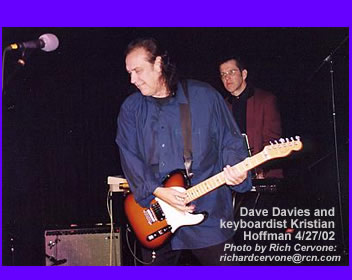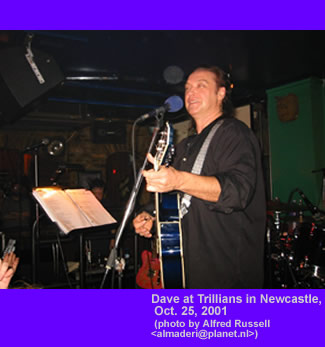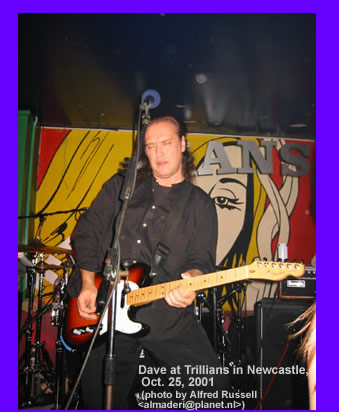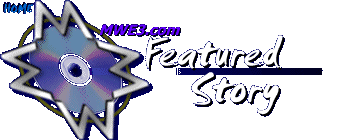Robert Silverstein:
RS
Dave Davies: DD
RS: It was really great seeing you play live at Downtown
out on Long Island on April 27th. Being a long time Kinks fan, it was a
real revelation. It would take me at least six hours to go into detail
about all my favorite Kinks albums and songs, but I gotta say after
hearing your new album Bug, I really think you’ve reached a new pinnacle
in your songwriting.
DD: Well, thank you.

RS: I’ve waited a long time for an album this good. How
long have you been working on the new album and could you say something
on how Bug came together as an album?
DD: Yeah, well primarily, I really only had a couple of
songs. I had "Fortis Green", "Let Me Be" and "True Phenomenon"—that I’d
been doing in the set. And it wasn’t until the idea for Bug came up that
I had an idea to put the album together. And it all came together really
quite quickly the end of last year. We went into the studio February 1st
and we had it finished by the 4th of March. It just went really, really
quickly. I think sometimes when I get like a theme in me head I tend to
work alot faster. You know the songs are kind of loosely connected and
themematic in a way.
RS: You’re quoted as saying that the basic idea of Bug
is that of seemingly ordinary people walking around with mind
controlling implants affecting their behavior, that could be triggered
any moment by outside forces like extra terrestrials and covert
government manipulation. And the idea of Bug is to exorcise these
implants through the power of music. And also that Bug is also a
metaphor for all the negative things that may be in us that prevent us
from reaching our full potential.
DD: Yeah. Well that was kind of like my ideological idea
I had when I came across the idea of Bug. It was interesting because how
it started was...on my website (www.DaveDavies.com)
and the spiritual planet web site people were sending me emails talking
about...one particular woman who said that she thought she had alien
implants that she felt was affecting her behavior and personality. So we
did a bit of research and found there’s quite a lot of case
history...about...particularly...we also would like people to say that
they’d been experimented on by the government, in a secret way, covert
kind of operation ala, kind of X-files. But this woman said that she
went to see a healer, a psychic healer and that she’d removed these
implants. And that gave me the idea of thinking about doing it with
music. And what was really funny was, that night, I went to bed and I
woke up in the middle of the night with this really bad mosquito bite on
my arm! (laughter). And I kind of modeled these ideas together with an
actual bug and the thing about the alien implants and out came the song
"Bug". But then it sort of attached itself to other ideas about, like
the way emotions can bug, or a bug in the machine, like in the computer.
And I thought that was kind of cool and like "De-bug" can be like a
de-programming process easily. So it kind of triggered alot of ideas and
it sparked alot of writing.
RS: It does seem like there’s alot of brainwashing going
on these days. On Bug’s lead-off song "Who’s Fooling Who" it seems like
you’re saying the more media we’re surrounded by, the less real
information we seem to be getting.
DD: I do believe that. I think we’re so...we’ve become
so dependent on exterior means of functioning. We depend on everything
outside of ourselves. Like the cell phone activity—the microwaves. We
haven’t really had time to really experiment with all this new
technology that’s going through the airwaves and we don’t think that
it’s affecting us. But they’re finding out about alot of electromagnetic
pollution that I mention on "Who’s Fooling Who". It’s almost like
there’s alot of people that believe that electromagnetic pollution
actually causes certain dysfunctions in the brain. So that people can’t
think as clearly or they can’t think straight or they get confused
easily. So it’s a very curious time to be alive (laughter) to say the
least! But on the upside, I think it’s kind of like a clearing process
as well. Particularly with things that we have, like yoga and meditation
and certain mystical practices can help to create within people a more
defined identity of who they are.
RS: It kinda reminds me of the Kinks song "Brainwashed".
The songs on Bug are really catchy and are compelling enough to make you
face the music so to speak. It’s all about trying to help elevate
people’s consciousness.
DD: Well it is, that’s one of the sub-themes of the
album where it goes all the way through questioning like with "Whose
Foolin’ Who", isolation with "Let Me Be" and "Displaced Persons".
"Displaced Persons"—the idea really came about with the Dalai Lama being
in Tibet. But then I realized it was about me and it fitted in with like
the whole scenario for the Bug album. And then it goes through a time of
hope with like "Rock You, Rock Me"—somebody searching in this confusing
environment and this dysfunctional world and realizing that we do have
basic tools within us to help us fight this, whatever it is. Which is
faith and hope and love, which is the foundation of like meditation
really and where it can take us spiritually. And it goes through these
steps, if you like. And "Life After Life (Transformation)", is really a
dance meditation to take people into another stage of consciousness, if
you like. But it doesn’t have to be that, it can just be a fun dance
thing. But the intent, when I worked with Russell, my son, we worked
together on (Transformation) "Life After Life"...
(at this point Dave is interrupted by our trusty
interviewer who kinda asks the Kinks guitar legend to speak louder,
etc.)
RS: One of my favorites on Bug is "The LIE" - which is
downright scary stuff. What is "The LIE"?
 DD: Well, "The LIE" is everything that takes us onto the
wrong path. It’s everything that makes us not work properly. We don’t
work properly as human beings, that’s why we we’re not getting on
terribly well with our environment, we’re not getting on terribly well
with each other at all. This dysfunctioning, this mis-communication is
"The LIE". You know, some of it conspiratorial, which I believe it is, I
think some of it is what’s happening in the global economy. Everything
is focused on commerce. I feel personally, that it’s a dangerous path to
take because we’ve worshipped money for too long. I believe that we
should utilize money and make it a force for good to help people, not to
gain power over people. It’s always the intent behind our actions that
makes our future whether it’s on a personal level, on a group level, or
on a racial level or a planetary level. I think that’s what we’re going
through at the moment—we’re paying for all the lies. "The LIE" is trying
to clarify—it’s about all the things that piss me off as well
(laughter). That’s homelessness, and how can people be homeless and
hungry when we really do have the technology and the will to feed
everybody on the planet. Why do they have to necessarily pay for it? Why
should people really have to pay for something that grows out of the
earth and our planet, which doesn’t really belong to us. "The LIE" is
many, many issues that I see in the world that make me unhappy.
DD: Well, "The LIE" is everything that takes us onto the
wrong path. It’s everything that makes us not work properly. We don’t
work properly as human beings, that’s why we we’re not getting on
terribly well with our environment, we’re not getting on terribly well
with each other at all. This dysfunctioning, this mis-communication is
"The LIE". You know, some of it conspiratorial, which I believe it is, I
think some of it is what’s happening in the global economy. Everything
is focused on commerce. I feel personally, that it’s a dangerous path to
take because we’ve worshipped money for too long. I believe that we
should utilize money and make it a force for good to help people, not to
gain power over people. It’s always the intent behind our actions that
makes our future whether it’s on a personal level, on a group level, or
on a racial level or a planetary level. I think that’s what we’re going
through at the moment—we’re paying for all the lies. "The LIE" is trying
to clarify—it’s about all the things that piss me off as well
(laughter). That’s homelessness, and how can people be homeless and
hungry when we really do have the technology and the will to feed
everybody on the planet. Why do they have to necessarily pay for it? Why
should people really have to pay for something that grows out of the
earth and our planet, which doesn’t really belong to us. "The LIE" is
many, many issues that I see in the world that make me unhappy.
RS: The song trilogy that closes Bug—"Bug", "De-Bug" and
"Life After Life (Transformation)" sounds like they’re connected. It
almost sounds like you’re trying to make contact with the spirit world.
DD: See, I’m a great believer in multi-dimensional
intelligence, potentially, that we’re multidimensional beings. Ignorance
of these things...it seems so curious that some of the so-called
religions of the world have helped dull our consciousness rather than
heighten it. Because it’s back to this greed and control thing. Well,
what are they so scared about? What the hell are we gonna do? Maybe if
everything was open, and nobody lied—and that’s a silly ideological
thing to say—but if everybody was open and free and liked each other and
tried to get on and didn’t lie, maybe things would start working out a
bit better for us. Because maybe we might be falling more in harmony
with nature. Nature doesn’t lie. It’s there, it does it’s thing and
that’s what it does. Maybe we need to get more back in tune with the
Earth and nature to find out where we’re going as a race. I think that
we interact much more with the spirit world than we think we do. I think
the more that we try and understand the spirit world and the other
world’s that are around us—which I’ve had alot of experiences with—I
think that we will be helped. I really do think that we’re not here all
alone, just trying to scramble through each day the best we can. I think
that if we reach upwards and reach up to higher ideals I think we’ll be
surprised how much we will be helped. And that’s really what the trilogy
(laugher), as you call it—which is funny because that’s what I call
it—that’s really what it means. Take "De-Bug" and de-program, thinking
about all the things you don’t like about yourself and the world and
trying to change them through de-programming process. And then moving on
and transforming your consciousness into a higher state. It’s all sort
of very grand ideas, but it’s what I believe and it’s also just
entertaining.
RS: Bug has one great song after the next. Perhaps my
favorite rocker on the album is "Let Me Be", which is so fine. It sort
of gets into another personality type on the album, like the guy that’s
just had enough of the world.
DD: That’s the guy isn’t it...it’s the same character!
They need to leave me alone, but he’s saying it to everything. He’s
saying it to the TV, he’s saying it to the telephone, he’s saying it to
technology. Look how bureaucracy is like a distraction, it’s like a
deliberate distraction to stop us thinking about more important things.
The fact of getting through a week—everybody, me, you, everybody—in this
weird society that we’ve constructed around ourselves, which is kind of
like a bit of a lie anyway. We spend so much time dealing with the
details, paper, packing, bureaucracy...it’s more and more and more. And
computer technology hasn’t taken away the misery of all these bits and
bills. Just look at the telephone bill! All the little bits and pieces
on it! Where does it go? To some national lottery tax?! There’s all this
kind of weird shit going on. Is it really all so absolutely necessary?
And the guy’s screaming in "Let Me Be"—just go away, leave me alone.
There’s more important things I want to do, which we all want to do.
Which you want to do, which I want to do.
RS: And I guess after all the trouble the guy’s been
through he’s ready for a more introspective song like "Rock You, Rock
Me", which is the song of hope on Bug.
DD: Well yeah, because I think in the end, I think human
beings are really resourceful creatures or whatever we are. And I think
those key words are like a mantra—faith and hope and love. If we can be
brainwashed by all this weird shit and all this negative stuff, maybe we
could reprogram ourselves by having faith and love and hope in the
future. Maybe it’s a similar thing—just brainwash ourselves to what we
want to be and not what somebody else wants.
RS: Bug may be loaded with challenging imagery, but it’s
also fun to listen to. The song "Fortis Green" is auto-biographical and
sounds inspired by my favorite Kinks album, Village Green Preservation
Society. Wasn’t that song first heard on the limited edition Fortis
Green album you put out privately on Meta Music?
DD: Oh right, yeah. I did a demo version of it that I
put out on a CD called Fortis Green. The whole thing about Bug is it’s
been a bit of a learning curve for me as well. It’s written from my
standpoint about my own life as well. And like, I’ve had alot of
emotional problems confronting my past and "Fortis Green" was a way of
me dealing with a lot of hidden emotions about my past and growing up
and how I miss certain people and all those kind of things. So that’s
kinda like a self-cleansing kind of piece—"Fortis Green".
RS: Was there any reason why you didn’t print the lyrics
to Bug?
DD: Actually, it’s interesting that you should say that
because I had thought of it and I wanted to make the artwork really
striking. I worked with a great guy who was totally on the same
wavelength as me—a guy called Jeff Chenault at Koch Records. It worked
great, I think, he really tuned into what I was trying to do. And then
the artwork looked so good, I thought, there’s no room for the lyrics. I
know this sounds a bit silly. I suppose then we would have gone into a
little booklet. In hindsight, maybe you’re right, maybe I should have
had a little booklet in there.
RS: The Bug cover art is really strange too. It looks
like there’s a bunch of aliens from the Twilight Zone on the back cover.
It looks like some of the pictures are from the ‘50s.
DD: You see, the reason I wanted it to be kinda late
‘50s, early ‘60s is because it appears to demonstrate how everything was
supposed to have been so perfect. Everything was okay in the late ‘50s.
When the middle classes were taking over the Western world (laughter).
Everything was fine, everybody had a car, everybody had a nice little
house. Everything was perfect. Our government was beautiful, everyone
went to church on Sunday. And I think it kind of juxtaposed my rage, if
you like and the lie of it all, the deception, and the self-deception.
It’s cruel to keep information from people. I think that’s where my rage
comes from. It’s easier to spot that period which was so clean and
pristine and everything was nice and perfect. So that’s why I used that
period.
RS: It’s a bit scarier in a sense.
DD: I think it makes it funnier, hopefully. You see, I
didn’t want to make it look too dark. When I finished the album, me and
my associate producer sat down and looked at each other and we both
went, ‘Oh, shit! is it too dark?’. And then we played "Why?!!" and "Fortis
Green" and "Whose Foolin’ Who" and then we checked out the artwork. See,
I think the artwork helps it get a bit lighter y’know? It was just a
little phobia I had at the end of the recording, but you get that
sometimes when you finish a project, ‘is anybody gonna like it?’. I was
really driven, and it was really intense work for four weeks. It was
like 12 hour, 14-15 hour days.
RS: Overall, Bug really rocks. Could you mention some of
the guitars that were used on Bug? Kristian Hoffman, is using some great
keyboard effects on the album too.
DD: Well I didn’t use any fancy gadgets really. I used
my basic guitar that I use on stage which is a Telecaster with a maple
neck. I prefer the maple neck. It sustains better. And I use trace
sensor pickups which is a kind of fairly standard package. And I use it
with my Mesa Boogie amp heads, which are Mark II heads that I’ve had
since 1980, the same amps which I run through Marshall 4x12’s. So I used
that mainly. But then I used a Gibson Les Paul on some things, the
de-tuning things and the more rhythmic things. And I used Guild
acoustics, a couple of very standard Guild acoustics on a couple of
other tracks like "Flowers In The Rain". I think Kristian...in fact the
whole band did a great job on the record. Gently, we started to rehearse
the songs which was like three or four days before we went in the
studio. These days, they’re coming together beautifully, the songs, we
want to keep it going.
RS: When I saw you play live it sounded like Kristian
was using a mellotron.
DD: No, we kind of trimmed up some presets that I had
for Bug. They were basic presets that I edited up to the sound I wanted.
RS: Another guitar question: Are you a big collector?
 DD: I used to be a collector. And having many wives you
tend to lose alot of guitars on the way (laughter). I’ve got guitars
that I keep that I don’t take out at all because when I’m on the road I
go out very basically with me Fenders, a couple of Mesa Boogie’s, one
guitar pedal and that’s it.
DD: I used to be a collector. And having many wives you
tend to lose alot of guitars on the way (laughter). I’ve got guitars
that I keep that I don’t take out at all because when I’m on the road I
go out very basically with me Fenders, a couple of Mesa Boogie’s, one
guitar pedal and that’s it.
RS: Do you want to mention some of your favorite guitars
from over the years?
DD: Obviously, I always have a special feeling for my
Harmony Meteor—my first electric guitar which I recorded "You Really Got
Me" with. I’d like to try and get hold of one, one day just as a bit of
a sentimental thing. The one with the cutaway. I’ve still got a Tele and
a Strat, early ‘50s, which I keep privately that I wouldn’t dare take on
the road. An old Martin, D-20 is it? I’m so terrible with modal names.
Yeah I’ve got a few guitars I keep, that I’ve kept.
RS: Are you living in England now?
DD: I live mainly in England, obviously that’s my home.
But I go backwards and forwards to Los Angeles. I have friends and
family in Los Angeles.
RS: Bug came out on Vel Vel Records though Koch
Entertainment. Walter Yetnikoff signed The Kinks to Vel Vel.
DD: That’s right, yeah.
RS: They did a great job on all the Kinks reissues and
then he sold out to Koch. How’s your relationship with Koch?
DD: Bob Frank, who runs the company...we get on really
quite well. I think what was very helpful to this project is the fact
that I need people there and you can phone them up and they answer the
phone. It’s not like big corporate companies that you phone up and you
leave 400 messages and maybe you get lucky if someone phones you back.
It’s more like a family set-up, which I prefer to work with.We just got
the thing together very quickly. The working relationship’s pretty good.
RS: You also have a pretty good relationship with
Sanctuary Records who recently put out an excellent double CD set of The
Kinks’ BBC recordings and a great new double CD Kinks compilation called
The Ultimate Collection. They also did a great job a few years back
reissuing all the Kinks ‘60s albums.
DD: Yeah, and they’ve done a great job. Wonderful I
think, it’s great that we’ve had that much support.
RS: Speaking of Kinks reissues, I want to ask if you
think there’ll ever be a 24 bit reissue of the late 1985/early ‘86 album
Think Visual? That has to be one of my favorite Kinks albums.
DD: That was the MCA period, that wasn’t it? I thought
that was a very overlooked record, Think Visual. And Phobia...I thought
they were both...U.K. Jive was MCA as well wasn’t it?

